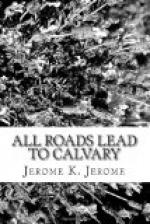She would get into correspondence with them, go among them, talk to them. The difficulty, at first, would be in getting them to write to her, to open their minds to her. These voiceless masses that never spoke, but were always being spoken for by self-appointed “leaders,” “representatives,” who immediately they had climbed into prominence took their place among the rulers, and then from press and platform shouted to them what they were to think and feel. It was as if the Drill-Sergeant were to claim to be the “leader,” the “representative” of his squad; or the sheep-dog to pose as the “delegate” of the sheep. Dealt with always as if they were mere herds, mere flocks, they had almost lost the power of individual utterance. One would have to teach them, encourage them.
She remembered a Sunday class she had once conducted; and how for a long time she had tried in vain to get the children to “come in,” to take a hand. That she might get in touch with them, understand their small problems, she had urged them to ask questions. And there had fallen such long silences. Until, at last, one cheeky ragamuffin had piped out:
“Please, Miss, have you got red hair all over you? Or only on your head?”
For answer she had rolled up her sleeve, and let them examine her arm. And then, in her turn, had insisted on rolling up his sleeve, revealing the fact that his arms above the wrists had evidently not too recently been washed; and the episode had ended in laughter and a babel of shrill voices. And, at once, they were a party of chums, discussing matters together.
They were but children, these tired men and women, just released from their day’s toil, hastening homeward to their play, or to their evening tasks. A little humour, a little understanding, a recognition of the wonderful likeness of us all to one another underneath our outward coverings was all that was needed to break down the barrier, establish comradeship. She stood aside a moment to watch them streaming by. Keen, strong faces were among them, high, thoughtful brows, kind eyes; they must learn to think, to speak for themselves.
She would build again the Forum. The people’s business should no longer be settled for them behind lackey-guarded doors. The good of the farm labourer should be determined not exclusively by the squire and his relations. The man with the hoe, the man with the bent back and the patient ox-like eyes: he, too, should be invited to the Council board. Middle-class domestic problems should be solved not solely by fine gentlemen from Oxford; the wife of the little clerk should be allowed her say. War or peace, it should no longer be regarded as a question concerning only the aged rich. The common people—the cannon fodder, the men who would die, and the women who would weep: they should be given something more than the privilege of either cheering platform patriots or being summoned for interrupting public meetings.




